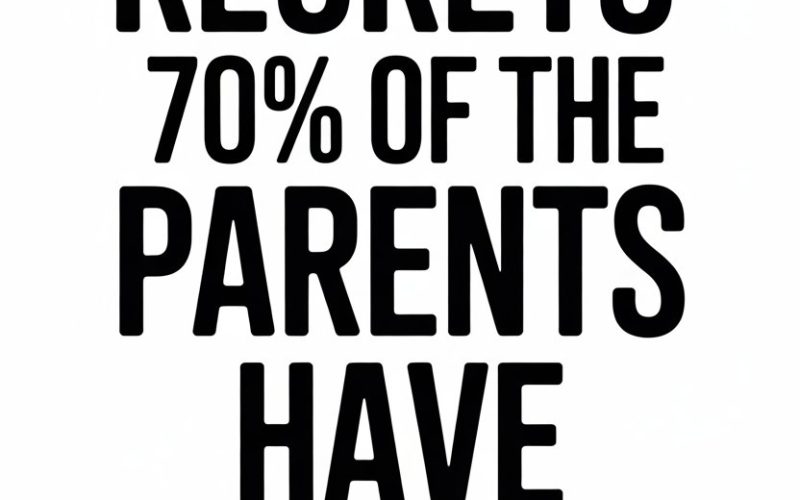Every parent gets a free ticket to the guilt parade—no invitation necessary. Even the most Pinterest-worthy mums and dads lie awake wondering if they’re getting anything right.
If you’ve ever replayed a conversation from three years ago, or eyed the neighbours’ kids and wondered what secret sauce they’re sprinkling on their cereal, you’re absolutely not alone.
Here are the seven regrets that trip up about seventy percent of parents, plus some practical ways to get less churned up and more present for your tiny (or not-so-tiny) humans.
1. Not Spending Enough Quality Time
Surprise! For most parents, the number one regret isn’t about the brand of pushchair, the right age for swimming lessons, or the questionable haircut you let them choose at age four.
It’s not being there—really being there.
Between commutes, school runs, housework, and the endless admin of family life, it’s easy to find yourself physically present but mentally scribbling to-do lists.
According to a study published in the Journal of Marriage and Family, what matters most to kids is not the sheer number of hours, but the quality of the attention they receive.
Here’s the fun bit: “quality” doesn’t mean a four-hour, Instagramable craft marathon (unless you’re into that sort of self-inflicted torture).
It means putting your phone away for a 15-minute story, actually listening to the retelling of Minecraft exploits, or making eye contact over a plate of spaghetti.
Tonight, pick one tiny window—bath time, bedtime, that five-minute walk to the car—and make it a “no distractions” zone.
See what happens when you really listen, even if it’s just to the saga of the missing Lego piece.
2. Worrying Too Much About Being Perfect
Nothing saps the joy out of parenting quite like the myth of perfection.
Instagram, TikTok, and the endless stream of parenting blogs can leave you convinced that everyone else is raising polyglot violin prodigies with organic meal plans and zero screen time.
Turns out, this quest for the gold star is exhausting and completely unrealistic.
A survey from Pew Research Center found the majority of parents feel pressured to do everything “right”—and nearly always feel like they’re falling short.
The antidote? Lower your standards. Seriously.
Kids don’t need perfect parents—they need real ones, who apologise when they lose their temper and know how to laugh when the dog eats the homework.
Try this: next time you mess up (and you will, because you’re human), narrate your own blunder. “Well, Mummy just burned the toast again. Oops!”
Let your kids see that grown-ups aren’t flawless. It’s healthier for everyone.
3. Not Saying “I Love You” or Showing Affection Enough
It’s astonishing how easily “I love you” gets swallowed up by “Where are your shoes?” and “Why is there toothpaste on the cat?”
Many parents report regretting not expressing enough affection once the whirlwind of childhood has passed.
Sometimes old family habits (stiff upper lip, anyone?) or the grind of daily life makes those warm fuzzies feel awkward.
But regular doses of affection, both verbal and physical, set children up for greater confidence and emotional health.
No need to turn into a human cuddle machine if that’s not your style—a pat on the back, a tousle of hair, or a note in a lunchbox works wonders.
Tonight, squeeze in an extra hug, or just say it out loud: “I love you, even when you stick peas up your nose.”
4. Over-Scheduling and Not Letting Kids Be Bored
Activity sign-ups, enrichment camps, music lessons, dance, football, Mandarin, coding… sometimes it looks like the only way to raise a competent adult is to turn your child into a time-blocked Google Calendar.
A huge chunk of parents wish they’d dialed it back and allowed for more free play and boredom. Boredom, as it happens, is the birthplace of creativity and problem-solving skills, according to child development experts.
Next time a free afternoon pops up, resist the urge to fill it. Let them tinker, daydream, or invent a new game with the dog (though do apologise to the dog in advance).
It may feel strange at first, but you’ll be gifting your child a crucial life skill: entertaining themselves without a screen or schedule.
5. Losing Patience Too Often
This one hurts. It’s almost universal for parents to look back and wish they’d handled meltdowns and messes with a little more zen and a little less Godzilla.
Chronic stress—fuelled by sleep deprivation, financial worries, or sheer volume of laundry—can leave even the most loving parent barkier than a terrier at the postman.
According to child psychologist Dr. Laura Markham, frequent snapping can leave kids anxious or disconnected.
What helps? Deep breaths, silly faces, even announcing, “I’m about to lose it, so I’m going to step into the loo for a minute.” The point isn’t to never get angry (good luck with that), but to model how to recover and repair.
Tonight, if you get snappy, try a quick reset: “Sorry, I was grumpy. Let’s start over.”
You’re showing your child that it’s okay to mess up, and it’s okay to make amends.
6. Not Listening to Their Child Enough
It’s easy to assume we know what our children need or want. After all, we’ve been feeding, clothing, and herding them through life since the days of nappy blowouts.
But as kids get bigger, many parents regret not tuning in to their child’s unique voice—and missing crucial opportunities to connect.
The Harvard Center on the Developing Child highlights that children who feel heard (not just managed) develop stronger self-esteem and resilience. Sounds great, right?
Start small: instead of solving every problem or rushing in with advice, try saying, “Tell me more,” or “That sounds tough. What do you think would help?”
If your child suddenly decides to share the drama from Year 4 at 9:43 p.m., bite your tongue and listen—even if you’d rather be watching telly.
Tonight, put down the dishcloth for five minutes and give your child your full attention. You might be surprised at what comes out.
7. Letting Worries About the Future Steal the Joy
This one sneaks up on even the most laid-back parents. The constant hum of “Am I doing enough?” and “Will they grow up alright?” can hijack the simple, sweet moments of family life.
A longitudinal study published in JAMA Pediatrics found that parental anxiety and future-focused stress can actually impact kids’ well-being—and that being present together, even for small routines, builds a sense of security.
If your mind is racing ahead to GCSE scores, university applications, and which brand of toothpaste will secure them a job, try anchoring yourself in what’s happening right now.
Your four-year-old’s dinosaur facts, your teen’s eye rolls, the kitchen dance party—these are the moments you’ll miss, not the strategic five-year plan.
Tonight, squeeze joy from the ordinary. Sing in the car. Laugh over the burnt dinner. Tell a joke so bad your child can’t help but groan.
The Regret-Free Zone: It’s Closer Than You Think
Here’s the secret: every parent messes up, wishes for a do-over, or feels like they’re winging it through most of the milestones. Regret is part of the job description.
But you can lighten its load starting now.
Notice the tiny windows for connection, drop the perfection act, hug your kids, let them get bored, model how to make up after a blow-up, and listen more than you talk.
Worry less about tomorrow and grab the best bits of today (even if those bits are covered in jam and glitter).
Perfection is overrated. Your love, your laughter, your willingness to try again? That’s what your child will remember.
And if tonight still feels like a mess, well, there’s always tomorrow—toast and all.




